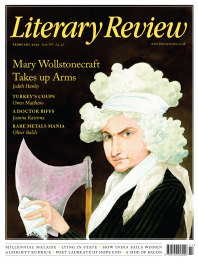Jonathan Rée
Falsely, Madly, Deeply
Heinrich Heine: Writing the Revolution
By George Prochnik
Yale University Press 319pp £16.99
Heartbreak is something that many poets do well, but none do it better than Heinrich Heine. His first substantial collection, which came out in 1827, when he was thirty years old, contained compelling poems of love and loss that amply justified its title, Buch der Lieder (‘Book of Songs’). Heine’s lyrics soon attracted the attention of musicians, starting with Franz Schubert, who immediately set six of them to music, bringing extra fame and power to such phrases as ‘Daß ich dich verloren hab!’ (‘that I have lost you!’). In 1840, Robert Schumann took up sixteen other poems to produce the song cycle Dichterliebe (‘Poet’s Love’), making lines like ‘Ich grolle nicht’ (‘I don’t complain’) still more famous. Buch der Lieder became a bestseller: Heine noted that his publisher, a better businessman than him, bought a mansion with the proceeds.
Heine had to content himself with a reputation as the lovelorn poet whose sufferings had inspired some of the greatest works of contemporary music. If you examine the poems more closely, however, you will discover that they are not so much the lyrical outpourings of a tormented soul as the

Sign Up to our newsletter
Receive free articles, highlights from the archive, news, details of prizes, and much more.@Lit_Review
Follow Literary Review on Twitter
Twitter Feed
Literary Review is seeking an editorial intern.
Though Jean-Michel Basquiat was a sensation in his lifetime, it was thirty years after his death that one of his pieces fetched a record price of $110.5 million.
Stephen Smith explores the artist's starry afterlife.
Stephen Smith - Paint Fast, Die Young
Stephen Smith: Paint Fast, Die Young - Jean-Michel Basquiat: The Making of an Icon by Doug Woodham
literaryreview.co.uk
15th-century news transmission was a slow business, reliant on horses and ships. As the centuries passed, though, mass newspapers and faster transport sped things up.
John Adamson examines how this evolution changed Europe.
John Adamson - Hold the Front Page
John Adamson: Hold the Front Page - The Great Exchange: Making the News in Early Modern Europe by Joad Raymond Wren
literaryreview.co.uk